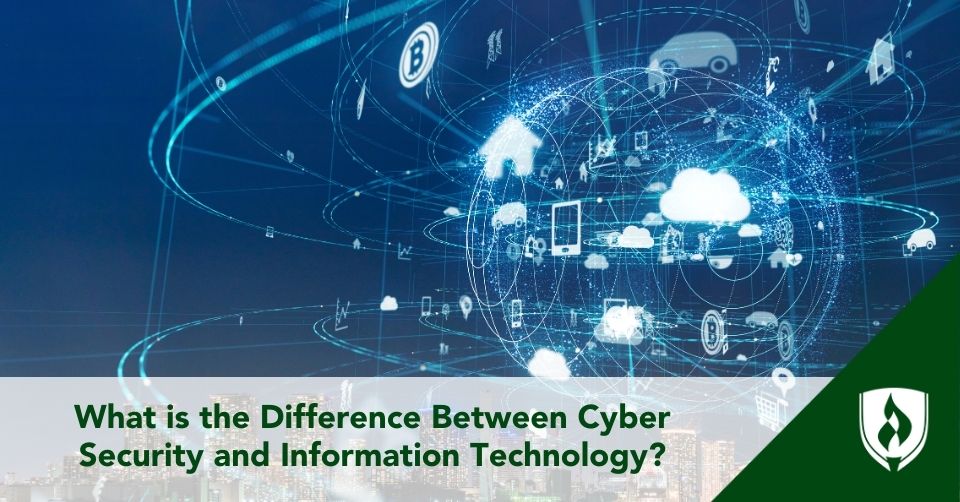What Is the Difference Between Cyber Security and Information Technology?
04/10/2025

Information technology (IT) and data have become increasingly intertwined with daily life, and demand for expertise in these areas has skyrocketed. According to the Bureau of Labor Statistics1, technology jobs are among the fastest-growing occupations in the United States. Nearly every organization needs data scientists, information security analysts, and cyber security professionals who can manage cyber risk, develop software applications, manage IT projects, and more.
If you are considering a career in information technology or cyber security, the best place to start is by understanding the similarities and differences between the two paths.
Information Technology vs Cyber Security: Similarities and Differences
Both IT and cyber security professionals may benefit from a strong foundation in technology, computer science, and problem-solving. The two career paths often share a need for skills like:
- Technology systems
- Digital infrastructure
- Cloud computing
- Network management
- Data analysis
- Troubleshooting
- Security and compliance
In addition to technical skills, professionals in both types of careers may benefit from developing skills in critical thinking, project management, collaboration, risk management, and attention to detail. Specific job skills and expectations for cyber security and IT professionals vary based on the role, employer requirements, location, and prior experience.
While IT and cyber security share a common foundation, each path focuses on distinct areas within the field of computer science and technology. Understanding their differences can help you choose a career path that aligns with your interests and aspirations.
Information Technology (IT) Responsibilities
Information technology (IT) is a broad field of knowledge that aims to help businesses, organizations, and individuals manage and analyze information effectively using a broad range of technologies. Information technology professionals typically need technical proficiency in software, hardware, computer networks, databases, and systems.
Job responsibilities may include:
- IT systems analysis and design
- Network administration
- Technology infrastructure management
- Project management
- Data analysis
- Database management
- IT business administration
Cyber Security Responsibilities
Due to the rapidly evolving cyber threat landscape, the demand for cyber security experts who can implement proactive strategies to protect systems, networks, and data is growing dramatically. The U.S. Bureau of Labor Statistics projects a 33% growth in jobs for information security analysts by 20332.
Cyber security professionals typically focus on safeguarding sensitive information, protecting data and systems from unauthorized access, and preventing cyber attacks which may result in financial loss, system damage, and data leaks. In these roles, professionals may use technologies, processes, and proactive security measures to safeguard digital assets and manage network security, risk and incident response, and potential security breaches.
Primary responsibilities often include:
- Safeguarding digital assets
- Managing intrusion detection systems
- Mitigating security incidents and data breaches
- Implementing data protection strategies
- Designing security protocols
- Leveraging digital forensics
Educational Paths for Information Technology and Cyber Security
While both information technology and cyber security roles typically require a broad foundation in technology skills and systems, their educational paths have distinct focus areas and curricula that may align with unique career aspirations.
Information Technology Education
If your career aspirations lean toward information technology roles in a business setting, your educational path may include an associate's or bachelor's degree program, industry certifications, and hands-on learning opportunities. Aspiring IT professionals typically study a variety of topics, including networking, programming, database management, systems administration, and hardware.
IT Certificate
A certificate program such as an IT Support Certificate or IT Project Management Certificate usually focuses on specific skills and knowledge areas that may help expand your career options. Completing a certificate program may help prepare you to earn industry certifications such as the PMI Certified Associate in Project Management3 or CompTIA A+4, which potential employers may value for some roles. A certificate program may also help you take your next step toward an associate's or bachelor's degree in information technology.
IT Associate's Degree
An Information Technology Associate's Degree aims to help you develop foundational skills that may be needed for setting up, customizing, and resolving issues with hardware, software, servers, networks, and devices. While specific program requirements and curricula may vary, coursework typically includes:
- System design and management
- Network security
- Troubleshooting
- Technical support
- Operating systems
This degree may help students gain knowledge and experience in examining and constructing sophisticated software systems, building protected networks, developing IT project strategies, ensuring data integrity, and collaborating with businesses of all sizes, from small operations to large corporations.
IT Bachelor's Degree
A Bachelor's Degree in Information Technology Management helps to build on the knowledge and skills emphasized in certificate and associate's degree programs. In addition to covering more advanced technical skills, the curriculum may focus more on leadership skills and management principles. Coursework varies by program, but will typically dive deeper into areas like:
- Advanced technical and analytical skills
- IT leadership
- Team management
- Data center configuration
- Operations management
- Enterprise applications support
Cyber Security Education
Cybersecurity professionals often play a critical role in identifying potential cyber attacks and mitigating emerging threats in a digital world. Certificate and degree programs typically concentrate on security principles, threat detection, vulnerability assessment, and risk management. They may emphasize key skills such as threat intelligence, ethical hacking, cryptography, and security frameworks.
Cyber Security Certificate Programs
Aspiring cyber security professionals sometimes begin their education with a broad IT certificate program to gain foundational skills. Another option is to start with a security-specific program, such as a Network Support Certificate. This program can help you develop the knowledge and skills you will need to earn industry certifications like the CompTIA Network+5 or Cisco® CCNA6.
Cyber Security Associate's Degree
An associate's degree may help you take the next step on your educational journey by helping you explore deeper security topics. For example, a Network Systems Administration Associate's Degree may include coursework in areas like:
- Industry hardware and software
- Network operations and maintenance
- Network security
- Systems administration
Specific courses and program requirements vary by program, and some programs may also include hands-on experience in the field or a virtual lab.
Cyber Security Bachelor's Degree
A Bachelor's Degree in Cyber Security can help aspiring cyber security professionals develop the advanced security skills they may need to pursue a specialized security role. Coursework for a cybersecurity degree may include developing key skills in cryptography, hacker techniques, virtualization, and malware reverse engineering, although specific courses and requirements vary by institution and program. In addition, you may also study key skills such as:
- Advanced networking
- Vulnerability analysis
- Security awareness
- Security risk management
- Software auditing
Cyber Security vs Information Technology: Career Outlook
Skilled technology professionals are in short supply. One survey projects that the tech industry will see more than one million additional technology jobs added to the workforce over the next ten years8. Aspiring cybersecurity and IT professionals may have many potential job opportunities available to them, depending on their location, job market, skills, and employer requirements.
Here are some of the most in-demand jobs for each career track. More advanced roles may have additional certification or educational requirements.
Cyber Security Jobs
High-demand jobs in cybersecurity include9:
- Cyber security engineer
- Security consultant
- Information systems security analyst
- Forensic analyst
- Network security engineer
- Information technology security analyst
Information Technology Jobs
In the field of information technology, high-demand jobs may include10:
- Computer and information research scientist
- Computer network architect
- Computer programmer
- Computer support specialist
- Database administrator
- Network systems administrator
- Software developer
- Web developer
- Project manager
How to Choose the Right IT or Cyber Security Degree
Selecting the best educational path comes down to your career aspirations and interests. Take some time to explore different programs and talk to an academic advisor to help you consider your next steps.
If you are interested in a cybersecurity role, check out our guide on How to Become a Cyber Security Specialist. If information technology is your desired field of study, you can find more information on keys to success by reading our guide, How to Become... Whatever path you choose, remember that your specific job prospects will vary based on several factors, including market needs, your background experience, where you're located, and what potential employers are looking for.
IT Support Certificate
Developmental Education courses do not count toward total program credits and are not calculated in GPA. Students must demonstrate mastery of the subject matter in Developmental Education courses through a Rasmussen University entrance placement exam, approved exemption based on previously completed coursework, or by passing Developmental Education courses. The University will reimburse students to sit for up to three recommended certification exams. Reimbursements will be made only once per certification exam. Students are responsible for paying for any additional attempts.
IT Project Management Certificate
Lower-level prerequisite courses of this program are NOT eligible for participation in Title IV federal student aid programs. The University will reimburse students to sit for up to three recommended certification exams. Reimbursements will be made only once per certification exam. Students are responsible for paying for any additional attempts.
IT Associate's Degree
Developmental Education courses do not count toward total program credits and are not calculated in GPA. Students must demonstrate mastery of the subject matter in Developmental Education courses through a Rasmussen University entrance placement exam, approved exemption based on previously completed coursework, or by passing Developmental Education courses. The University will reimburse students to sit for up to three recommended certification exams. Reimbursements will be made only once per certification exam. Students are responsible for paying for any additional attempts.
Bachelor's Degree in IT Management
The University will reimburse students to sit for up to three recommended certification exams. Reimbursements will be made only once per certification exam. Students are responsible for paying for any additional attempts. A student enrolled in an associate degree program through Rasmussen University Online may dual enroll in this Bachelor’s degree program when enrolled in the final 12 credits needed to complete their enrolled associate’s degree program, and all program acceptance requirements are met. The student may be scheduled to complete Associate program course requirements before taking Bachelor-level courses. The student will graduate from their enrolled associate degree program only when all course requirements specific to that program have been completed. Students who choose this option to dual enroll cannot complete the final 12 credits in the associate degree as self-directed assessments (SDA). Students enrolled in a Rasmussen University Certificate or Diploma program are not eligible to dual enroll in this Bachelor’s degree program. Students enrolled in a residential program through a campus are not eligible to dual enroll in this program.
Network Support Certificate
Developmental Education courses do not count toward total program credits and are not calculated in GPA. Students must demonstrate mastery of the subject matter in Developmental Education courses through a Rasmussen University entrance placement exam, approved exemption based on previously completed coursework, or by passing Developmental Education courses. The University will reimburse students to sit for up to three recommended certification exams. Reimbursements will be made only once per certification exam. Students are responsible for paying for any additional attempts.
Network Systems Administration Associate's Degree
Developmental Education courses do not count toward total program credits and are not calculated in GPA. Students must demonstrate mastery of the subject matter in Developmental Education courses through a Rasmussen University entrance placement exam, approved exemption based on previously completed coursework, or by passing Developmental Education courses. The University will reimburse students to sit for up to three recommended certification exams. Reimbursements will be made only once per certification exam. Students are responsible for paying for any additional attempts.
Bachelor's Degree in Cyber Security
The University will reimburse students to sit for up to three recommended certification exams. Reimbursements will be made only once per certification exam. Students are responsible for paying for any additional attempts. A student enrolled in an associate degree program through Rasmussen University Online may dual enroll in this Bachelor’s degree program when enrolled in the final 12 credits needed to complete their enrolled associate’s degree program, and all program acceptance requirements are met. The student may be scheduled to complete Associate program course requirements before taking Bachelor-level courses. The student will graduate from their enrolled associate degree program only when all course requirements specific to that program have been completed. Students who choose this option to dual enroll cannot complete the final 12 credits in the associate degree as self-directed assessments (SDA). Students enrolled in a Rasmussen University Certificate or Diploma program are not eligible to dual enroll in this Bachelor’s degree program. Students enrolled in a residential program through a campus are not eligible to dual enroll in this program.
1Bureau of Labor Statistics. "Fastest Growing Occupations." U.S. Bureau of Labor Statistics. Accessed March 3, 2025. https://www.bls.gov/ooh/fastest-growing.htm
2Bureau of Labor Statistics. "Information Security Analysts." Occupational Outlook Handbook, U.S. Bureau of Labor Statistics. Accessed March 4, 2025. https://www.bls.gov/ooh/computer-and-information-technology/information-security-analysts.htm
3Project Management Institute. "Certified Associate in Project Management (CAPM)®." Project Management Institute. Accessed March 4, 2025. https://www.pmi.org/certifications/certified-associate-capm
4CompTIA. "CompTIA A+ Certification." CompTIA. Accessed March 4, 2025. https://www.comptia.org/certifications/a
5CompTIA. "CompTIA Network+ Certification." CompTIA Partners. Accessed March 4, 2025. https://partners.comptia.org/certifications/network
6Cisco. "Cisco Certified Network Associate (CCNA)." Cisco Training & Certifications. Accessed March 4, 2025. https://www.cisco.com/site/us/en/learn/training-certifications/certifications/enterprise/ccna/index.html
7Rao, S. "New Approaches to the Tech Talent Shortage." MIT Technology Review, September 21, 2023. https://www.technologyreview.com/2023/09/21/1079695/new-approaches-to-the-tech-talent-shortage/
8Deloitte. "Overcoming the Tech Talent Shortage Amid Transformation." Deloitte Insights. Accessed March 4, 2025. https://www2.deloitte.com/us/en/insights/topics/talent/overcoming-the-tech-talent-shortage-amid-transformation.html
9Indeed Editorial Team. "Types of Cyber Security Roles." Indeed Career Advice. Accessed March 4, 2025. https://www.indeed.com/career-advice/finding-a-job/types-of-cyber-security-roles
10Bureau of Labor Statistics. "Computer and Information Technology Occupations." Occupational Outlook Handbook, U.S. Bureau of Labor Statistics. Accessed March 4, 2025. https://www.bls.gov/ooh/computer-and-information-technology/



